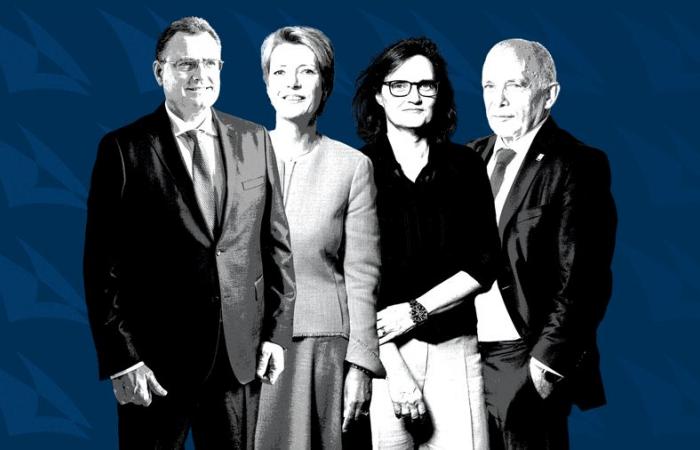On 569 pages, the investigative commission’s paper shows the major failings of the Federal Council, Finma and SNB. The authorities share responsibility for the downfall of the big bank.
In the focus of the PUK: Ex-National Bank President Thomas Jordan (left), Finance Minister Karin Keller-Sutter, Finma President Marlene Amstad and former Federal Councilor Ueli Maurer.
Illustration Simon Tanner / NZZ
The Swiss authorities painted a heroic self-image after the CS rescue in March 2023. They had achieved a feat of strength, a skillfully executed maneuver that saved the economy and Switzerland from catastrophe. The emergency takeover of Credit Suisse (CS) by UBS, so the story goes, was the best of several alternatives – precisely planned, without any costs for the taxpayer and in the end even profitable.
NZZ.ch requires JavaScript for important functions. Your browser or ad blocker is currently preventing this.
Please adjust the settings.
The report of the parliamentary investigative commission (PUK) exposes this self-image for what it is: a piece of political PR on its own behalf.
On 569 pages, the PUK report provides the first high-resolution picture of how the authorities accompanied the CS to its downfall over several years. It’s worrying.
The report shows: In the acute phase of the crisis, the authorities were hardly able to counter the downfall of Credit Suisse with crisis management that was too late, too uncoordinated and ultimately chaotic. Someone always hesitated, and there was never a common feeling of urgency in the collective of the financial market supervisory authority, the National Bank and the Finance Department that CS now really had to be pulled out of the swamp. Instead, everyone distrusted everyone.
The “Swiss Finish” in banking regulation, which was proudly talked about in Switzerland after the major financial crisis in 2008, also turned out to be a fraud. From 2015 onwards it degenerated into a “Swiss discount”: the Swiss authorities, who believed they were playing a pioneering role internationally, allowed the risks in Credit Suisse’s balance sheet to become a time bomb over the years.
The failures became visible to the whole world for the first time in autumn 2022. When customers first ran on Credit Suisse, the Federal Council was missing a central instrument to strengthen public trust in the bank’s solidity: the so-called public liquidity backstop. Ueli Maurer had opposed its introduction for years. Now this instrument would have been needed for the cash-strapped Credit Suisse. But it was too late for a flash introduction because that would have created even more uncertainty around the collapsing major bank.
Finma acted at short notice and depending on the situation
At least as problematic as the roles of the finance department and its former head is that of Finma: it often intervened with CS in the years before the crisis. But when the going got tough, she suffered from biting inhibition. She acted short-sightedly and situationally, without looking at the big picture, namely what the long-term consequences of her restraint might be.
In the last years of its independent existence, the financial market supervisors even allowed CS to hide its financially worrying situation from the market and customers: When Credit Suisse would have had to hold more equity due to new accounting regulations, Finma granted it generous exceptions. The “regulatory filter” allowed CS to gloss over its capital situation. Without this filter, CS would have had to raise well over 10 billion francs in additional capital.
If the bank had not succeeded in this, its capitalization would have fallen – and shareholders, customers and the public would have realized how bad CS’s financial health is. But Finma, of all people, prevented this.
The PUK states soberly in its report: “The filter allowed CS AG to maintain the appearance of sufficient capitalization until the end.” It is still unclear to what extent political pressure from Ueli Maurer’s finance department played a role in granting the filter. In addition to Finma President Marlene Amstad, Mark Branson – the former director is now head of the German financial services regulator – also has to put up with unpleasant questions.
The episode shows that as a financial center you can introduce the strictest capital requirements in the world. If you neutralize them freely at the crucial moment through exceptions, they are worthless.
The supervision was surprisingly lenient, and not just when it came to capital requirements. As even the PUK, which is politically harmless, complains, Finma has never used its harshest sanction instrument against the CS in all these years.
For fear of lengthy legal proceedings, it has not once withdrawn any of the CS top managers’ guarantee of impeccable management, a measure that amounts to a de facto professional ban. The reluctance may have confirmed the CS leadership’s assumption that Finma could be a nuisance but never a threat.
Mistrust hindered cooperation
The failure of the authorities is all the more serious because many things went wrong in dealing with the CS crisis that had not worked when rescuing UBS fifteen years ago. Protocols were often not kept and communication between authorities was poor. Mistrust prevented real collaboration. The Finance Minister acted as a single mask in the Federal Council for months.
When the situation at Credit Suisse worsened from the summer of 2022, Ueli Maurer treated his Federal Council colleagues as if they had nothing else in mind than to undermine the stabilization of the big bank.
He informed them irregularly, incompletely and only verbally. The mistrust within the collegiate authority may have been collateral damage from the Corona period, when there were indiscretions in the Federal Council at almost every meeting. But in the end there was not a single indiscretion in the CS crisis.
But one should not blame Maurer alone: the other members of the government also have a responsibility. You already complained in autumn 2022 about the inadequate information from the SVP Federal Council. But they clearly haven’t given enough weight to their demands for better information after the bank run that was visible to the whole world. In the collegiate authority, everyone looked after themselves and their department.
The unminuted “non-meetings” between Ueli Maurer and ex-SNB President Thomas Jordan with the presidents of the two major banks are also an expression of a surprising lack of trust in the committees and processes established after the financial crisis.
The National Bank and its former president come out best in the report. But they shouldn’t be too happy about the relatively muted criticism of their role in the CS crisis. As a “lender of last resort” they took on their role in the CS crisis. But the liquidity support was ultimately not enough in March 2023 to provide the bank with enough liquidity before the weekend of the rescue. The CS had not prepared enough security. Emergency law was needed.
The PUK leaves open whether the SNB was too formalistic when granting emergency liquidity, probably in order to avoid being accused of political influence on the independence of the National Bank. Nevertheless, the National Bank under its new President Martin Schlegel should be clear: this must not happen again.
Admitting mistakes is not one of the strengths of Swiss politics and its authorities. A prime example is Finma, which blatantly glossed over its own performance in the CS crisis at the end of 2023 in a “lessons learned” report and did not admit a single specific error.
To ensure that the mistakes of the past are not repeated, it is imperative for the individual responsible parties, but above all for the government organizations as a whole, to name their own failings.
The financial market supervisory authority made a start on Friday afternoon. In a message she wrote meekly: “Finma can understand the criticism expressed in the report about the implementation of the regulatory filter in 2017.”
If, in addition to Finma, the Federal Council and the National Bank are also self-critical, then hopefully there will no longer be a need for a heroic rescue operation in the next banking crisis.






